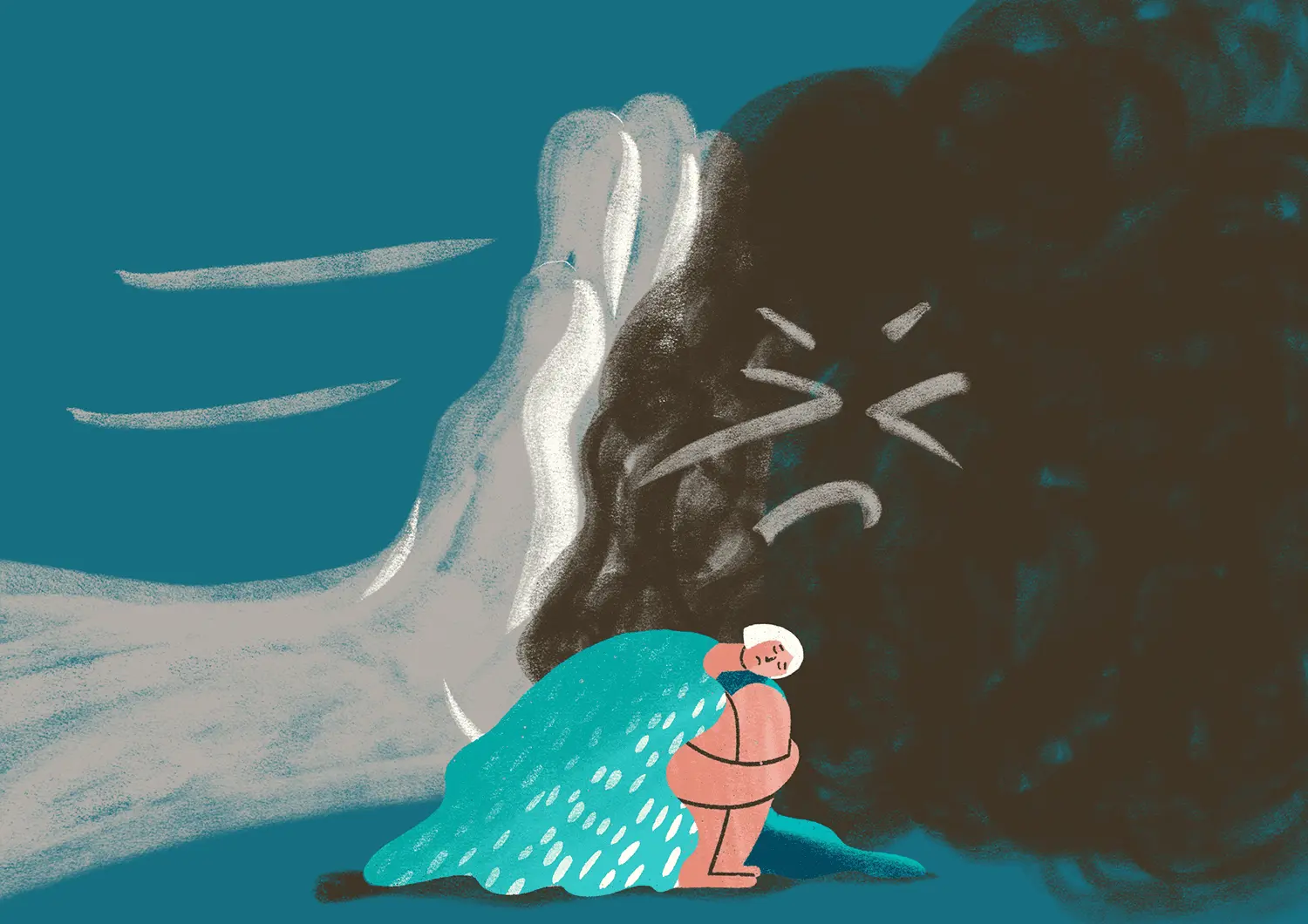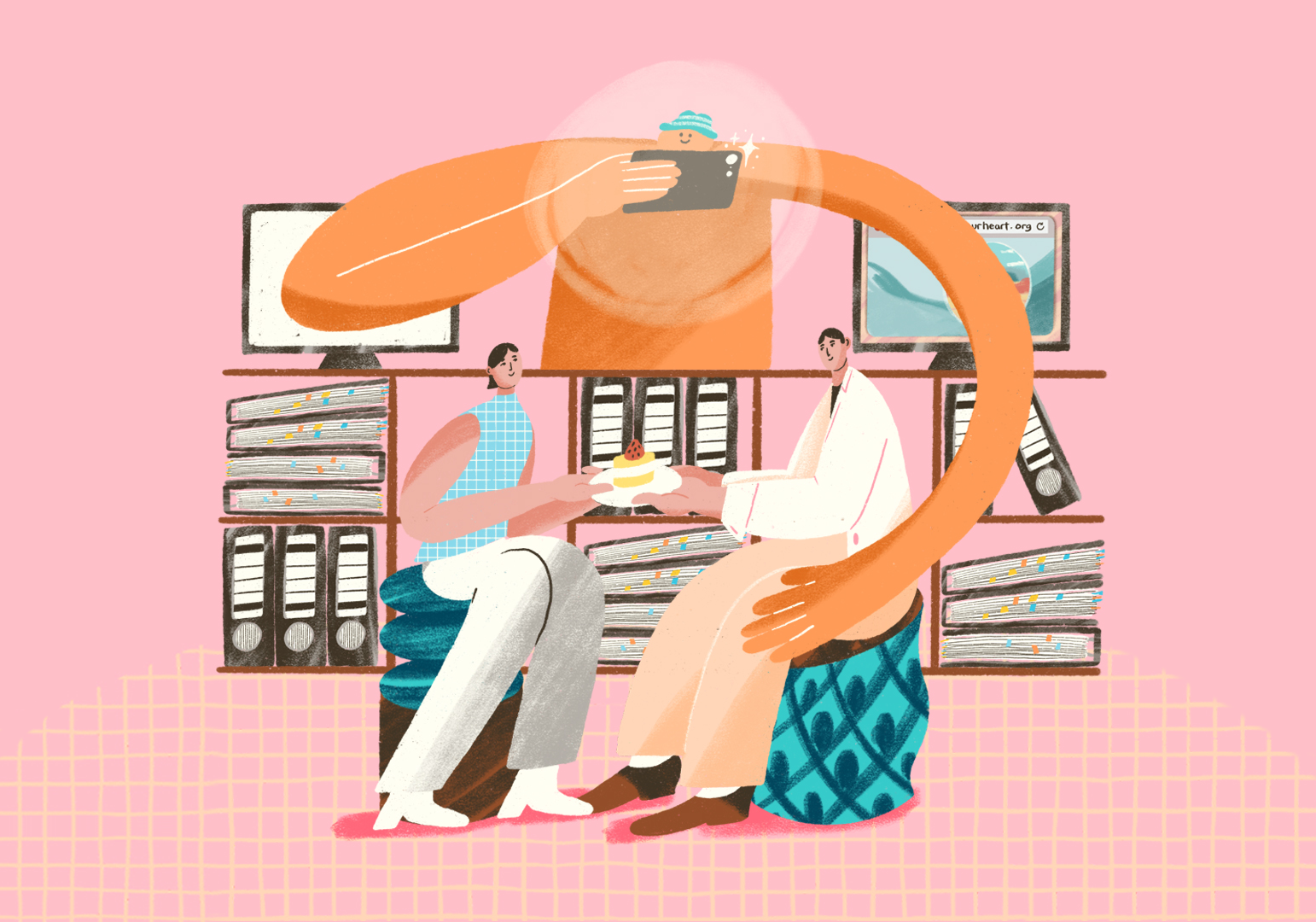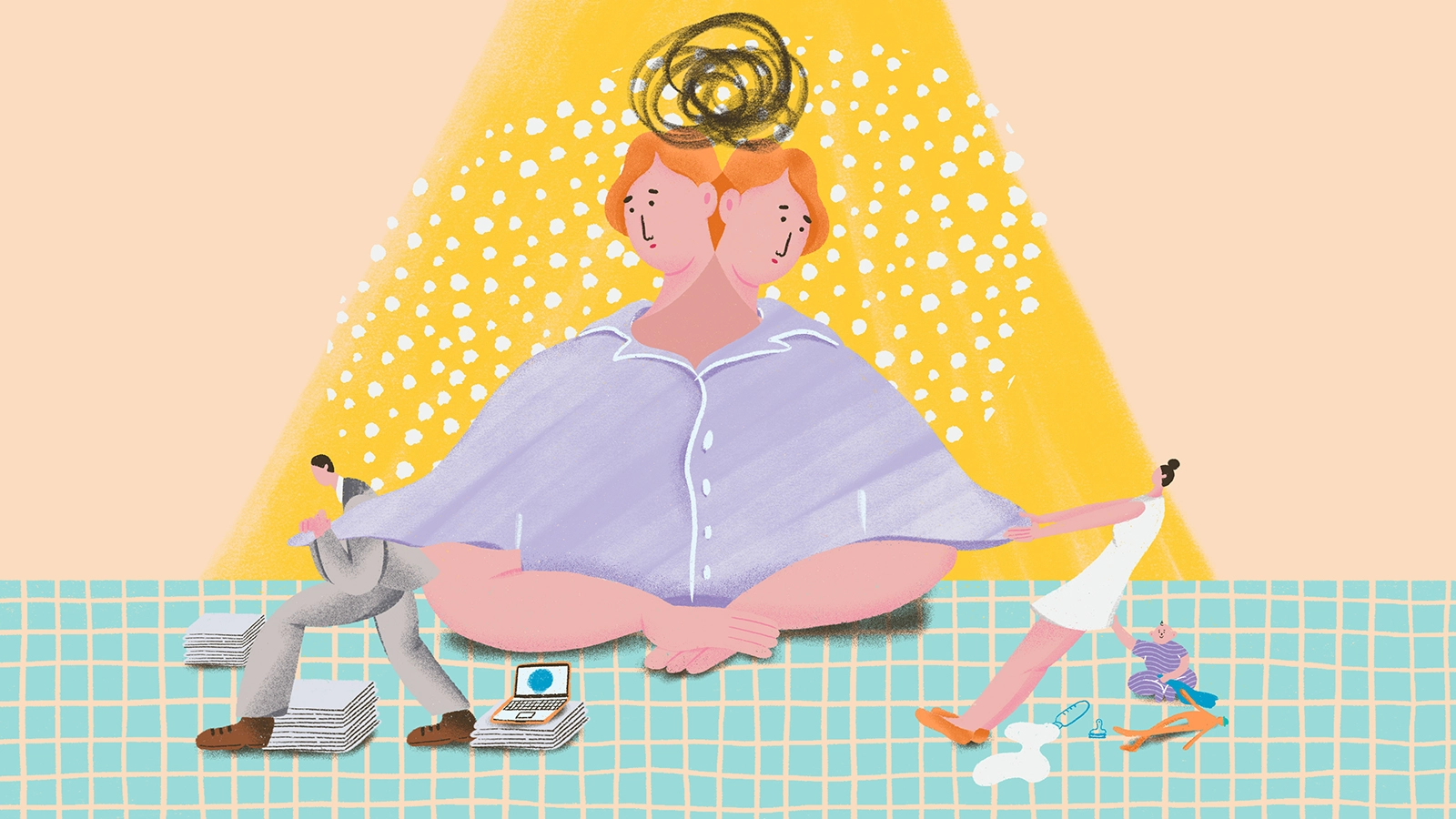
In the eyes of her colleagues, she is seen as a diligent and hardworking employee who always arrives and leaves on time, and rarely attends social gatherings. To her father, she is a thoughtful daughter who frequently accompanies him to medical appointments. Her children view her as someone who always looks busy, rushing to take them to classes and then to work. And to the vegetable vendor, she is a reliable regular customer who shows up on time every day... This is a true portrayal of the life of a caregiver.
Caregiving can impose an unseen weight, as there is no physical marker or sign that identifies someone as a caregiver. It can be challenging to recognize caregivers based on their appearance, age, occupation, or any other external factors, and we may not be aware of the difficulties they face in their role.
(Recommended reading: The Lonely Serenade of a Young Caregiver)
In this article, we will explore more challenges faced by caregivers.
A Caregiver is Always Close By
Caregiving is a term that we often hear, but what does it actually mean? In Hong Kong, there is no clear definition, and the International Alliance of Carer Organizations states that:
- Carers provide help and care to meet the physical and mental health needs of others
- Caregiving is typically provided in a formal capacity by paid employees in hospitals, healthcare institutions, social service agencies, and domestic helpers
- Informal caregivers, who are typically unpaid, are often family members and friends, but may also include neighbors or other significant individuals in the care recipient's life.
In addition to the more commonly recognized child and elderly caregivers, there are also various types of caregivers who provide care for individuals with specific needs, such as those with special learning needs (also known as SEN), those who are recovering from mental illness, or those living with chronic illnesses.
According to the recently released “Child Caregiver Survey Report 2023” by the local organization “Care for Caregivers”, over 70% of the respondents are full-time caregivers who spend more than 8 hours a day taking care of their families. Furthermore, over half of them have given up their personal careers or hobbies due to their caregiving responsibilities.
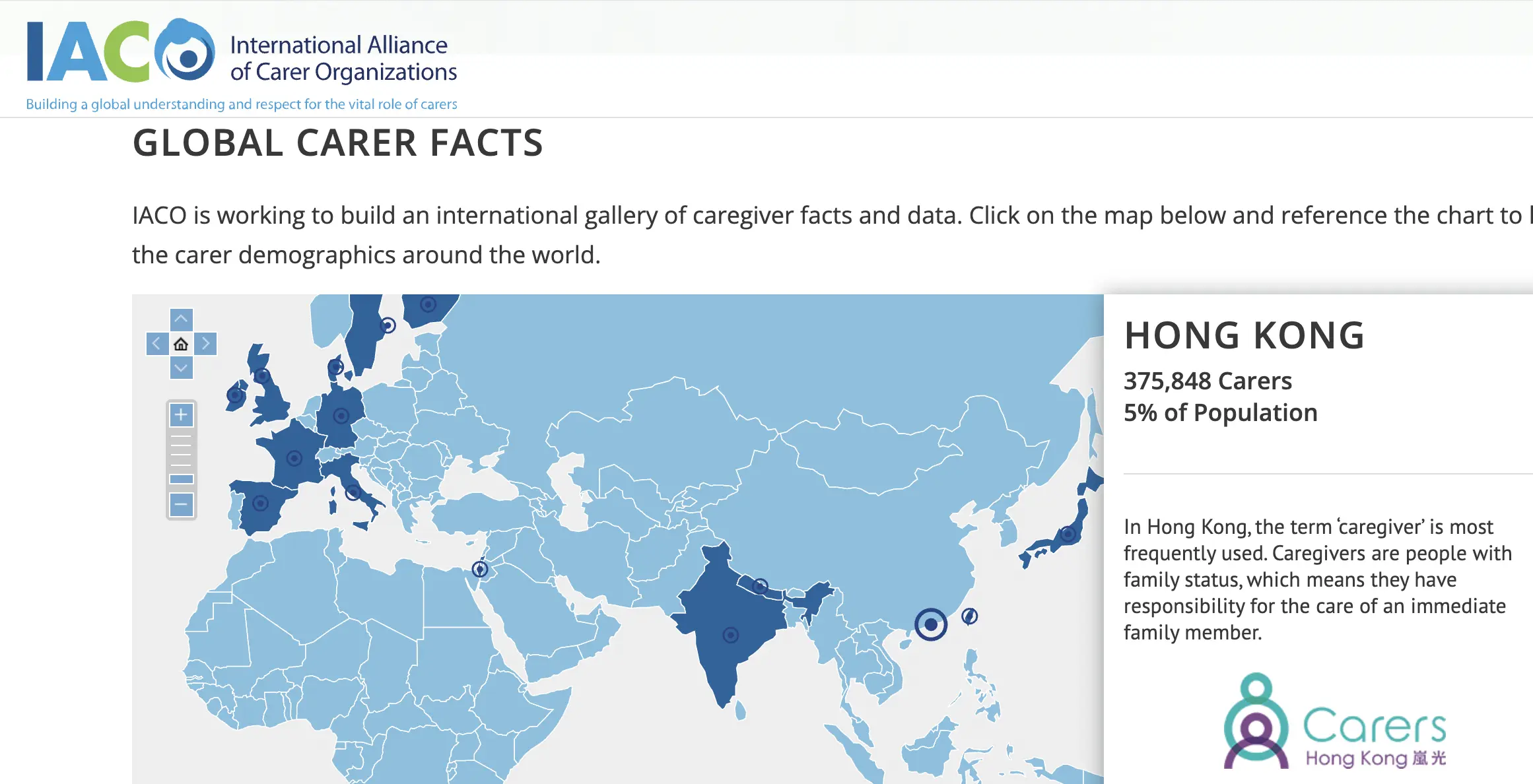
(The International Alliance of Carer Organizations indicates that there are over 370,000 caregivers in Hong Kong, yet the government has not officially established a definition for caregivers, resulting in a lack of relevant data. Community organizations have compiled data on the number of elderly individuals, people with chronic illnesses, and individuals with disabilities in Hong Kong, estimating that there are approximately 1.12 million caregivers.)
Common Challenges Faced by Caregivers
Rosalynn Carter, wife of former U.S. President Jimmy Carter, founded the Rosalynn Carter Institute for Caregivers, and as a caregiver, she said:
“Being a caregiver requires infinite patience, physical and emotional strength,
health care navigation skills, and a sense of humor -
which can be hard to come by
after sleepless nights and demanding days.”
Some foreign scholars specialize in studying the "caregiver stress syndrome", which refers to the depression and other physical and mental reactions caused by the prolonged stress of caring for others. Symptoms may include irritability, physical and mental fatigue, insomnia, high blood pressure, diabetes, and immune system disorders.
Locally, according to the Hong Kong Polytechnic University's "Consultancy Study on Needs and Support Required of Carers of Elderly Persons and of Persons with Disabilities in Hong Kong Main Report" (2022), caregivers who were interviewed noted that coping with the behavioral and psychological conditions of their care recipients was extremely stressful. High-risk caregivers typically faced the following situations:
- long hours of intensive caregiving work
- a history of domestic violence
- behavioral problems of the care recipients
- a lack of recognition and support from those around them
- caring for multiple people with disabilities
- experiencing thoughts of suicide/murder followed by suicide
Caregivers are faced with stressors in all aspects of life, including:
Physical Burden
- health problems such as chronic fatigue, gastrointestinal problems, headaches, high blood pressure, sleep disorders, lowered immune system function, etc
Mental Burden
- such as grief, feelings of loss and helplessness, anger, denial, guilt, being overly dependent, low sense of self-worth, etc.
Economic Burden
- care expenses such as purchase of assistive devices, transportation costs, loss of work income due to caregiving (leave of absence, poor work performance, early retirement, etc.)
Social Burden
- Reduced personal time, gathering time with friends, tension in family relationships, social isolation, etc.
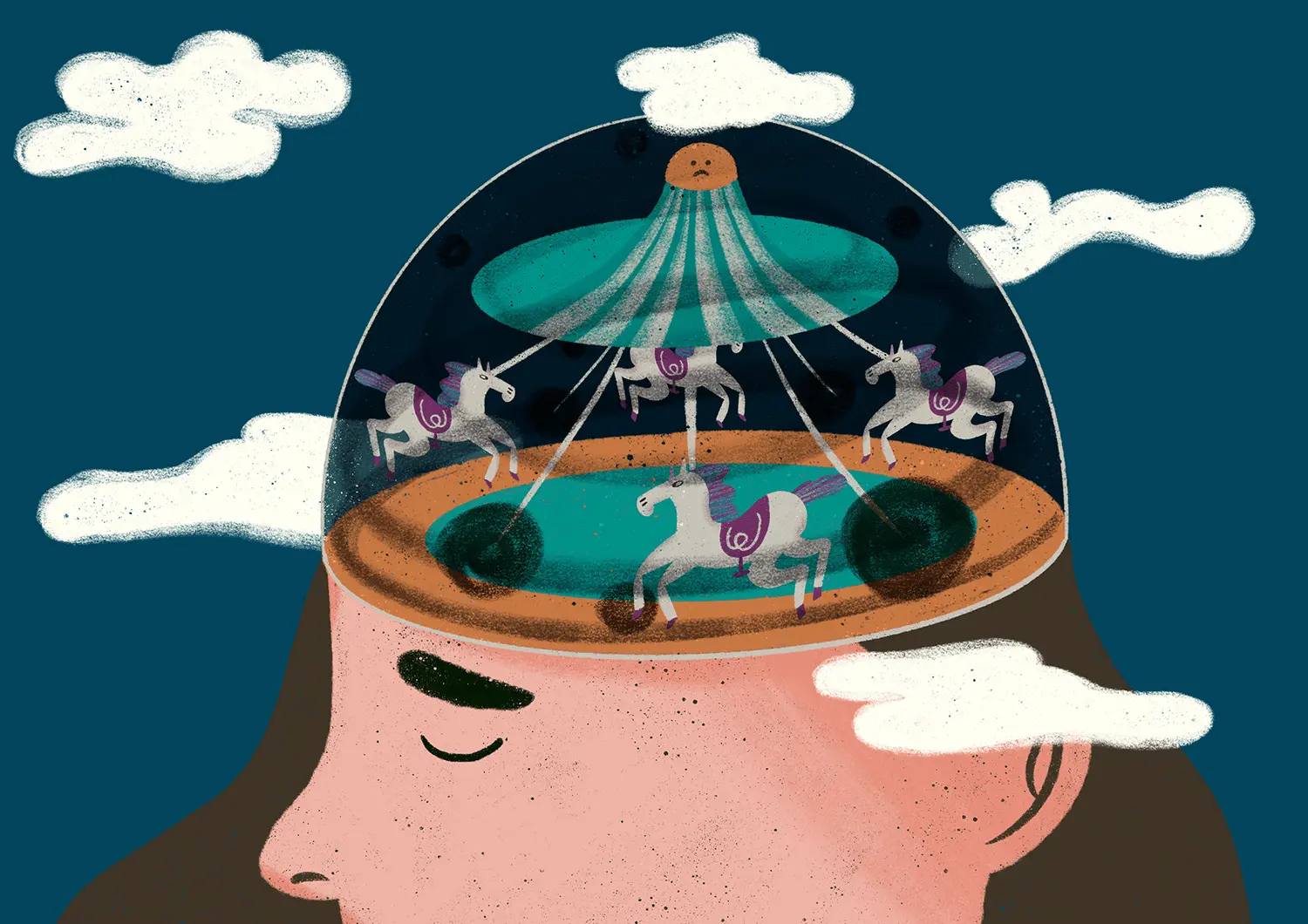
Caregivers experience a progressive level of stress, according to the Stress Process Model proposed by Pearlin et al. in 1990. Direct sources of stress include the frequency of caregiving, the care recipient's ability, and the severity of cognitive impairment. Other factors that contribute to stress include family relationships, perceived health, and the caregiver's personal traits, such as gender, age, religious beliefs, social support, and self-efficacy. All of these factors influence the caregiver's physical and mental well-being, with each factor intertwined.
The Integrative Model of Caregiving developed by Mak in 2005 identifies macro and micro factors affecting caregivers of adults with persistent serious mental illness. Macro factors include
- socio-cultural background (such as the caregiver's ethnicity, education level, and income) and
- interpersonal relationships (such as caregiver-care recipient relationship, marital status, and resident status). The model also emphasizes the impact of the mental health service system on the caregiver's experience.
For instance, the study found that caregivers of individuals with health insurance who were enrolled in “managed care” programs, which provide comprehensive healthcare services, were less satisfied and more concerned about their healthcare welfare than those enrolled in “fee-for-service” (FFS) programs. This was because access barriers or procedures for service users may be more complicated in managed care, and there are usually fewer options available. The healthcare system's design can greatly influence the caregiver's experience.
The Tender Agony of Transparent and Suffocating Loneliness
An overseas study on caregiver loneliness found that almost two-thirds of caregivers experience feelings of loneliness, with nearly 20% reporting extreme loneliness. The study also revealed that caregivers who feel lonely are more likely to experience anxiety, sleep problems, and have higher perceived physical and mental fatigue.
Another study found that elderly individuals who care for their children and grandchildren may experience a reduction in loneliness, while caring for an elderly partner can lead to increased feelings of loneliness. The researchers note that caring for children often involves participating in social care networks, such as interacting with other parents, schools, and organizations. This provides more opportunities for socialization and support, with mental health benefits similar to those of volunteering.
In contrast, caring for an elderly partner often involves more time-consuming tasks, such as bathing and feeding, and may lack the support of others. This type of caregiving may even be perceived as “preparation for the transition to widowhood”, leading the elderly caregiver to feel more isolated and helpless.
All manner of physical and mental strains may act as the “final straw” for caregivers, and with each gesture of kindness and support, we offer a “life-saving” straw. In our next article, we'll delve into ways to bolster caregivers in their workplaces and communities, and explore methods by which caregivers can tend to their own needs.
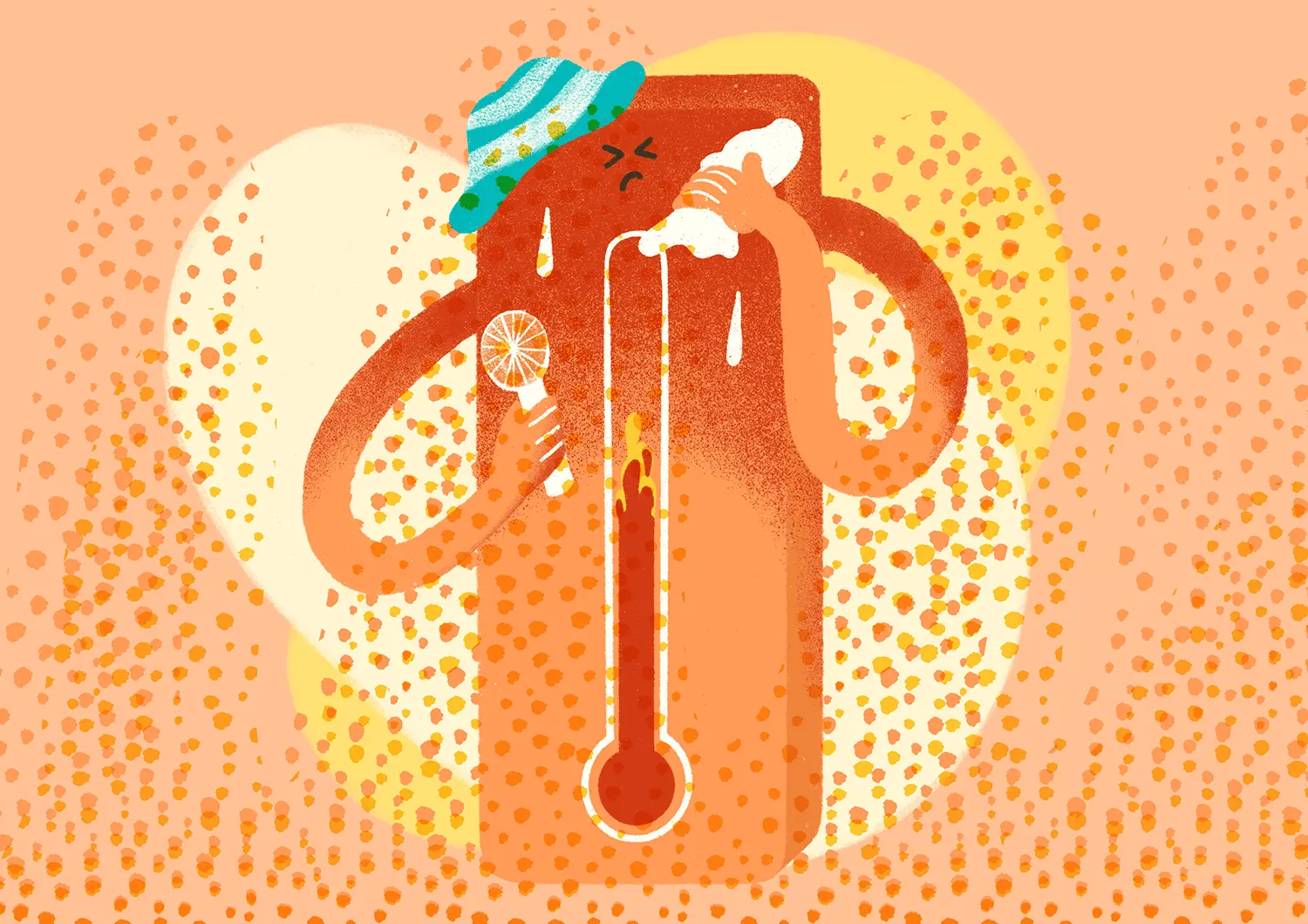
If you are a caregiver, you may take a few minutes to complete the Caregiver Strain Index Scale.
This questionnaire, designed by Robinson in 1983, is intended to measure the physical, social, financial, and emotional strains experienced by caregivers. The scale was later revised by Thorton Travis in 2003 and translated and validated by Lui, Lee & Mackenzie of the Chinese University of Hong Kong in 2004.
- Caregiving is confining. (e.g. restricting free time or cannot go out)
- Caregiving is inconvenient. (e.g. it takes so much time or it's a long drive over to help.)
- Caregiving is a physical strain. (e.g. because helping in and out of a chair, effort or concentration required)
- My sleep is disturbed. (e.g. care recipient is in and out of bed or wanders around at night)
- There have been family adjustments. (e.g. because caregiving has disrupted routine, there has been less personal time)
- There have been changes in personal plans. (e.g. had to turn down a job; could not go on vacation)
- There have been other demands on my time (e.g. from other family members)
- There have been other emotional adjustments (e.g. because of severe arguments)
- Some behavior is upsetting ( e.g. incontinence, care recipient has trouble remembering things, or accuses people of taking things)
- It is upsetting to find the care recipient has changed so much from his/her former self.
- There have been work adjustments (e.g. having to take time off)
- Caregiving is a financial strain.
- I feel completely overwhelmed. (e.g. concerns about how to manage the care recipient.)
* A score of 7 or more of “Yes Responses” would indicate a greater level of stress.


